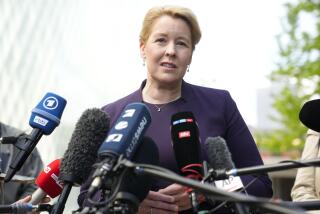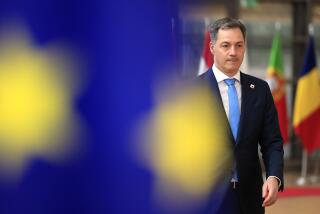Belgian Killing, Threats Raise Specter of Fundamentalist Violence
PARIS — An Orthodox Jew was shot and killed in the Belgian city of Antwerp on Thursday and death threats targeted Belgium’s justice minister and three other politicians, raising fears of a spillover of the extremist violence roiling neighboring Netherlands.
Police in Antwerp had not determined the motive for the slaying of Moshe Yitzak Naeh, who was shot in the head as he walked home from a synagogue shortly after midnight. Naeh, 24, was a British citizen who worked at the temple.
There were no immediate signs that his death was motivated by bias, prosecutors said. But the crime did not appear to be related to robbery, according to initial reports.
Antwerp, home to one of Europe’s largest Orthodox Jewish communities, has suffered ethnic tension, most recently the stabbing of a teenage Jewish boy this summer by a gang of youths of North African descent. Belgian authorities said the recent conflict in their country and the Netherlands made them concerned that anti-Semitism was behind the attack.
Federal police Thursday were pursuing a separate investigation into death threats against four political leaders, including Sen. Mimount Bousakla, who represents Antwerp. At least three of the four have been involved in law enforcement or political activities against Islamic fundamentalism.
Bousakla, a Socialist senator, went into seclusion under police guard after a caller threatened her with “ritual killing” this weekend, her assistant said.
Belgian police are investigating the Antwerp slaying and the death threats for links to Islamic extremism, particularly to the recent killing of Dutch filmmaker Theo van Gogh in Amsterdam, a Belgian investigator said.
But he cautioned against jumping to conclusions.
“Of course we are looking at it all very hard because of what has happened in Holland,” the investigator said. “But it’s too early to say what we have yet. We don’t want to get caught up in hysteria.”
A daughter of Moroccan immigrants and vocal opponent of the abuse of women in the Islamic community, Bousakla had recently criticized Belgium’s Islamic leaders for failing to denounce the slaying of the outspoken Van Gogh, whose killer shot him, stabbed him and slashed his throat in ritualistic fashion on Nov. 2.
Bousakla’s case recalls that of Dutch legislator Ayaan Hirsi Ali, a Somali-born feminist who wrote the screenplay for a recent short film by Van Gogh about the mistreatment of Muslim women.
Ali went into hiding when police learned that the suspects in the Van Gogh plot also allegedly planned to kill her and other Dutch leaders. Dutch police arrested several dozen suspects in the case and related crackdown.
Belgian federal prosecutors expanded an investigation of the threat against Bousakla after the Justice Ministry received a letter Thursday threatening Justice Minister Laurette Onkelinx; former Justice Minister Philippe Moureaux, who is now the municipal representative of an ethnically mixed area of Brussels; and another legislator whose identity was not revealed.
“We have decided the risk in the third person’s case is greater, so we are not going to reveal their name,” said Lieve Pellens, a prosecutor and spokeswoman. Authorities also will not disclose the contents of the letter, she said.
Investigators say it’s unclear whether Thursday’s letter is related to the threat against Bousakla. But the Dutch suspects plotted against targets with a similar profile, police say.
Bousakla, 32, has withstood previous threats and even a physical assault in her native Antwerp. Three groups coexist uneasily in that port city: the Jewish community, a far-right Belgian nationalist party and a militant Islamic organization, the Arab-European League, that has been accused of inciting unrest among young people and hostility toward Jews.
Bousakla had expressed her disappointment that Islamic organizations did not condemn the Van Gogh killing, which was followed by arson attacks on mosques and churches.
The events in the Netherlands made a strong impression in Antwerp, a Flemish-speaking city that is geographically and culturally close to the Netherlands.
Bousakla had publicly predicted that the turmoil could spread across the border to Belgium.
More to Read
Sign up for Essential California
The most important California stories and recommendations in your inbox every morning.
You may occasionally receive promotional content from the Los Angeles Times.










